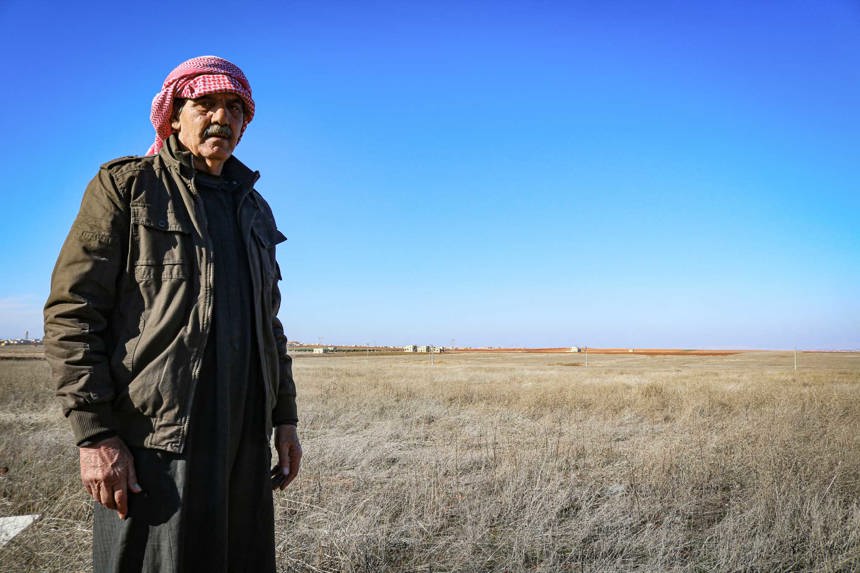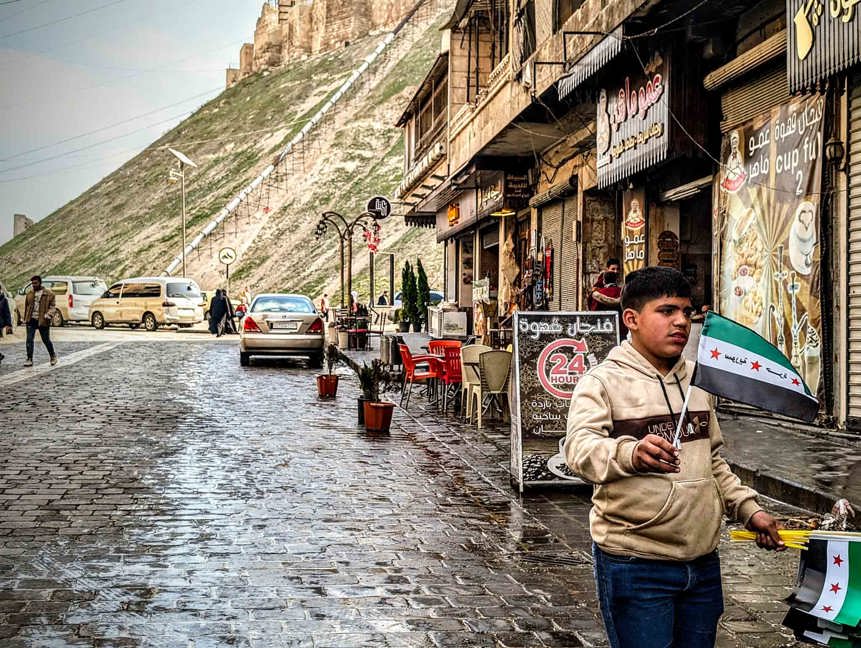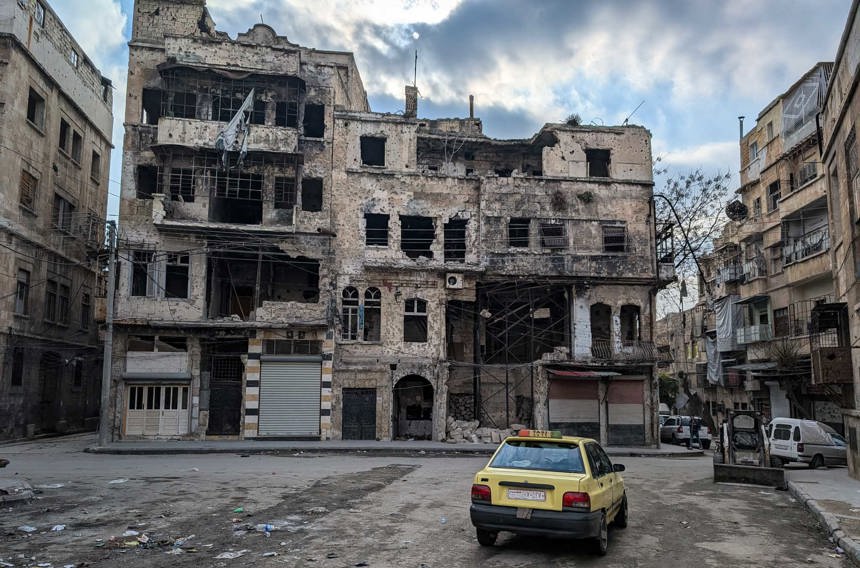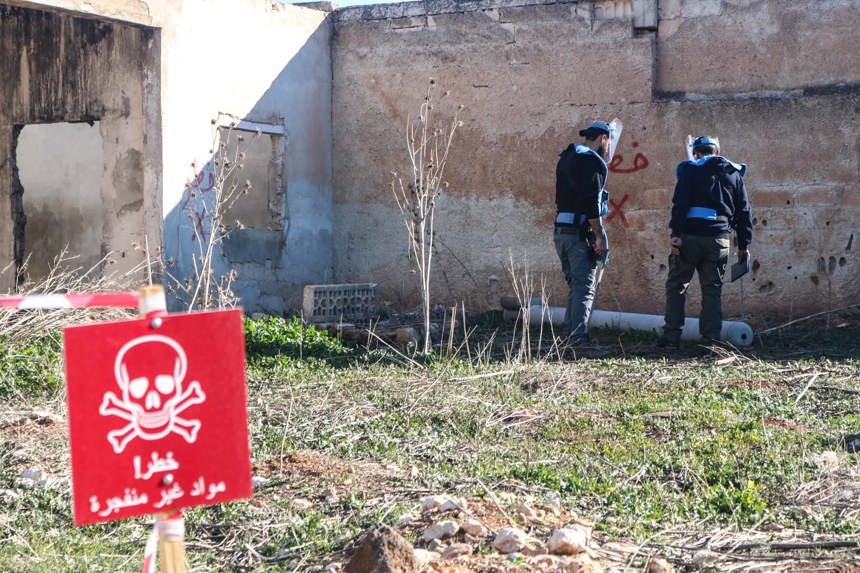Original article written by HALO's Paul McCann for The National.
The scars that disfigure Syria after 14 years of civil war are wider than its minefields. Hundreds, perhaps thousands, of towns and villages across the country have been destroyed or abandoned in one of the Middle East’s grimmest conflicts.
For 10 miles as you approach Aleppo, Syria’s ancient second city and World Heritage Site, you pass through a wasteland of destruction: factories, elegant villas and modest homes all pummelled by war, abandoned and then stripped clean by the former regime.
Those who survived, such as Rami Al Qasim, a Syrian farmer, face big problems. Outside his house, he stands at the top of a wall of earth overlooking a field that is about the size of 10 football pitches. Behind him are trenches and foxholes dug by troops of Bashar Al Assad's regime next to his largely destroyed house. Discarded cigarette packs, empty pill bottles and holes punched in the walls to create firing positions have been left behind by the troops who fled in December.
Rami has the misfortune to own a farm on what was, until last month, the front line between the Syrian military and the opposition forces who overthrew the 50-year Assad dictatorship.

Rami Al Qasim, in front of mined land
He returned after the fighting to find his fields planted with landmines. “This is good land," he says. “It gave us a good living. We can use the income from the land to rebuild. But we cannot plant the land with mines laid across it.” His field is part of a chain of minefields laid for hundreds of kilometres along the front lines that ran across northern Syria separating the regime and the opposition-held enclaves in Idlib and Aleppo governorates.
Rami’s neighbour hired "a man with a metal detector" to search his field but he stepped on a mine and was killed, the neighbour injured. Fruitlessly, Rami has tried to set fire to plastic waste – hoping to burn the dried grass in the field and detonate the mines. The man with the metal detector is one of several hundred victims of landmines and abandoned ordnance since Al Assad’s overthrow.
While there are no official statistics, global landmine clearance organisation The HALO Trust is monitoring reports and has compiled a list of about 280 casualties – including 27 children killed – by explosive ordnance since Al Assad fled. As with Afghanistan in 2021, and seen in countless other conflicts, there is always a sharp rise in civilian casualties from explosives when fighting ends and people are desperate to return home.
The HALO Trust has been working in Syria for eight years, until now in opposition-held areas. It is the only organisation clearing minefields safely for farmers like Rami. Its teams also destroy individual explosives reported by local people. It is currently dealing with 10 times the number of call-out requests than before the revolution late last year.
The Assad military and its allies would strip out electrical wiring and window frames from abandoned homes to sell for scrap. Grey galvanised water tanks litter the roadsides. They were taken from homes, filled with sand and used with oil drums to build defences around military outposts. It was a scavenging state, cannibalising its own people to survive.

Aleppo Citadel
In central Aleppo, following Friday prayers last week, there was a carnival atmosphere around the city's enormous citadel. Overlooked by bombed-out buildings, families promenaded wrapped in the new flag of the revolution, and young men and a drummer began an impromptu dance at the steps of the ancient fortress. The city’s new rulers, from Hayat Tahrir Al Sham (HTS) keep a low profile, there is only one checkpoint on the way into the city and two or three young men with Heckler & Koch MP5 machineguns slung on their backs mingle with the crowds at the citadel.
Most of the ancient Aleppo souq, with its priceless heritage of medieval khans and hammams, is closed, some of the accessible lanes piled with rubble from the waves of fighting that shattered the city from 2012 to 2016, when the regime retook the city. Some sections have been rebuilt but in Aleppo, Homs and even Damascus, the regime was clearly unconcerned about reconstruction.

Central Aleppo destruction
In the centre of Aleppo there is life at ground level – streets with taxis, bustling shopfronts and markets full of people. But look up and virtually every building is blackened, pock-marked and vacant. Dusty mannequins dressed in the fashions of a decade ago stand in abandoned shop windows.
The contrast with what were opposition-held areas in Idlib is stark. Modern shopping malls and restaurants have been built on the main roads. While there are still huge, tented camps of displaced people, there are also newly built luxury housing developments. Coaches carrying curious Syrian shoppers, most of them women from Hama and other bomb-damaged cities further south, have started to appear at the malls in the north-west.
To get there they travel up the M5, Syria’s much fought-over main artery. For a stretch of 100km to 150km, the towns and villages on either side are abandoned wrecks. Rebuilding Syria will take decades. But that reconstruction can’t start until the explosives littering the land are made safe.

HALO team checks 220mm Urgan Thermobaric rocket
One day last week in the village of Luf, south of the depopulated city of Saraqib, a HALO team was called out to look at a 220mm Urgan rocket carrying a thermobaric – or fuel air explosive – payload. Villagers approached the technical team about another explosive device. Less than 1km away, HALO found six cluster bombs, primed and still in their canister, too dangerous to move. The bombs were a mere 50m from the tents of a displaced family.
Another report came in of four artillery shells dumped by a quarry, but on the way to investigate, the team passed nine 23mm high explosive incendiary projectiles – used to bring down helicopters – sitting on a rock next to a ploughed field, presumably placed there by the farmer who found them.
On the way out of the village some children flagged down the HALO vehicle to tell them about an artillery shell they found a week earlier in an abandoned house. The team hands out business cards with their call-out number wherever they go so people can report more ordnance.
“In these frontline and fought-over areas we are seeing unprecedented levels of explosives contamination”
“In houses, in gardens and the fields of returning people, it is everywhere. And these people are desperate to get the items moved so they can start planting in the spring. When they hear the sound of us doing a safe detonation, they appear out of nowhere to tell us about another explosive," said Feras.
“Some of the people are moving devices themselves or hiring someone who claims to know what they’re doing," he added. "This is behind a lot of the accidents. But there is also a lot of poverty and many people, especially young boys, who are looking for scrap metal are also being killed and injured.”
As well as clearing explosives, HALO's risk education teams tour the frontline villages teaching adults and children about the devices of which they need to beware. In classrooms they use songs and puppets to teach the youngest to report anything they find. They also stop for an impromptu session in a field with children tending sheep and goats – herder communities that travel across this contaminated land are particularly vulnerable.
As well as clearing explosives, HALO's risk education teams tour the frontline villages teaching adults and children about the devices of which they need to beware. In classrooms they use songs and puppets to teach the youngest to report anything they find. They also stop for an impromptu session in a field with children tending sheep and goats – herder communities that travel across this contaminated land are particularly vulnerable.

A HALO team teaching risk education to children
HALO, made famous when Princess Diana visited a minefield in Angola in 1997, works in more than 30 conflict-affected countries around the world but its Syria programme had been one of its smallest until now.
The frozen nature of the conflict made it difficult to attract international donors to fund the training of local people and grow the clearance teams. HALO is hopeful that the swift and surprising fall of the Assad regime brings a rapid response from international donors. It is desperately needed in the face of an explosive humanitarian catastrophe in Syria’s wrecked landscape.


